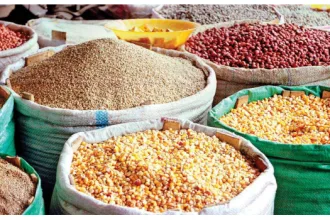After the devaluation of the Nigerian currency (Naira) in recent months, the local currency of the West African market region is facing additional challenges as cross-border traders are now refusing to accept it.
Until now, the Naira has been the primary currency in the sub-region, widely used by traders across borders due to the significant trade volume between those countries and Nigeria.
The Nigerian currency is traded with convertibility status in the unofficial payment systems of various countries.
Some traders interviewed including Nigerians, expressed their concerns about holding Naira due to its continuous depreciation since last year, with the most significant decline recorded last month.
Official reports show that the Naira, which was above N1/1.5CFA in the first quarter of 2023, significantly decreased to N1/0.9CFA in the second quarter and further to N1/0.8CFA in the third quarter of 2023.
After a period of moderate stability in the fourth quarter of 2023, the currency opened at N1/0.66067 CFA in January 2024.
After experiencing a second wave of devaluation in February, the sub-regional currency significantly dropped to N1/0.38308CFA before reaching a new low of N1/0.37595CFA last week.
Chartered Financial Analyst (CFA)
Traders are already hedging against potential further devaluation, despite a slight improvement observed in the last few days.
The Naira, however, has not regained its former strength in the subregion compared to previous years. This decline is significantly impacting the prices of imported goods into Nigeria via West African countries. As a result, traders are experiencing a slowdown in business operations in border towns between Nigeria and the Benin Republic.
During visits to certain border markets in Benin-Nigeria, it was observed that many money changers or Bureau De Change no longer exhibit the Nigerian currency as they did the previous year.
Transportation providers and motorcyclists, commonly referred to as Okada in Nigeria, have started refusing payments in Naira for journeys crossing borders. They explained that converting Naira to CFA upon return would result in a loss of earnings. Hence, they find it more secure to hold onto CFA instead.
A bike rider named Ibrahim Yakubu, who transported a news correspondent from the Seme border to the ‘Misebo’ market (approximately 45 kilometers away), declined payment in Naira and requested to be paid in CFA instead.
Yakubu also mentioned that previously, the Naira was robust and widely accepted as a payment method for goods and services.
A money changer from Taiye Ekiti attributed the situation to the United States Dollar, stating that the depreciation of the Naira in Benin Republic, Togo, and Ghana is due to the high cost of the Dollar. The money changer highlighted that Bureau De Change operators are facing similar challenges to other business owners.
A Nigerian trader specializing in secondhand clothing, Mr. Achi Collins, mentioned that many traders no longer accept Naira, highlighting the significant loss in the currency’s value over time.
Collins also mentioned that many traders advise their customers to convert their money to CFA before accepting it as payment for goods.
However, he mentioned that in the border town of Seme, there might be a few traders who still accept Naira for payment, although their products are priced higher.
He also mentioned that within the cities of Benin Republic, the Naira is not accepted due to its value in comparison to the strengthening of the CFA.
He added,
To make a purchase here, you must exchange your Naira for CFA before buying anything you need.
In the past, the Naira was widely used and accepted on the West Coast, stretching from Ivory Coast to Senegal. Traders freely transacted with Naira across many West African countries. Nigerian sports journalists who reported on events in Benin Republic, Togo, Ghana, Senegal, and Ivory Coast used Naira for purchases in local markets. At that time, the Naira held more value than the CFA. However, those days have passed, and now the Naira is no longer accepted in these countries.









